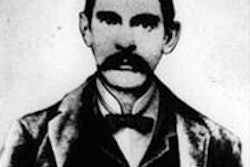
"I would have pulled out my teeth to play Fantine," actress Anne Hathaway said in a recent interview. "It was such a dream, and I can't believe I'm the girl who got to play her."
Hathaway was referring to her role as Fantine in the motion picture "Les Misérables," based upon the book of the same name by French author Victor Hugo. Published in 1862, the story has been adapted to the big screen four times (1935, 1958, 1998, and 2012). The novel -- an indictment of post-Napoleonic French society circa 1830 -- is considered one of the greatest of the 19th century. The well-respected American author Upton Sinclair called it the sixth greatest literary work of all time.
 "Les Misérables" is up for the Best Picture award at this year's Oscars, and Anne Hathaway is nominated for Best Actress in a Supporting Role for her portrayal of Fantine. Image courtesy of Universal Studios.
"Les Misérables" is up for the Best Picture award at this year's Oscars, and Anne Hathaway is nominated for Best Actress in a Supporting Role for her portrayal of Fantine. Image courtesy of Universal Studios.
Fantine, a fictional character, is loosely based upon a prostitute who Hugo saved from arrest for assault in 1841. Hers is a life of downward spiral. We first meet her in 1817 as a young teenage girl. Hugo wrote that she was born in rural France and "had never known father or mother." The young orphan girl was named Fantine by "the first random passer-by, who had encountered her, when a very small child, running bare-legged in the street."
She moves to Paris at the age of 15 to seek her fortune. "She was a lovely blonde, with fine teeth," wrote Hugo, adding she had "gold and pearls for her dowry; but the gold was on her head and the pearls in her mouth." Her teeth are a constant theme of Hugo in describing the young woman: "Her splendid teeth had evidently received an office from God -- laughter."
While her hair and teeth are her crown jewels, Hugo expanded on his description of his heroine: she is "brilliant of face, delicate of profile, with eyes of deep blue, heavy lids, feet arched and small, wrists and ankles admirably formed, a white skin which, here and there allowed the azure branching of the veins to be seen, joy, a cheek that was young and fresh ... a strong and supple nape of neck, shoulders modeled as though by [the sculptor Guillaume] Coustou with a voluptuous dimple in the middle, visible through the muslin; a gayety cooled by dreaminess; sculptured and exquisite -- such was Fantine."
Into the dark
In Paris, Fantine falls in love and moves in with a young aristocratic college student. For a while she enjoys the good life. Money is not an object, she wears silk gowns and satin ribbons in her hair provided by her wealthy paramour. The inevitable happens and Fantine bears his child -- Cosette, a girl. After three years, her lover returns to his aristocratic family, jilting Fantine and abandoning his daughter -- treating the affair as nothing more than a youthful amusement -- leaving her to care for their daughter alone and without any financial support.
She moves back to her small rural village in Northern France and finds work in a local factory. She is forced to leave Cosette in the care of an unscrupulous couple who run an inn in a nearby village to hide her bastard child. Single motherhood at the time was considered sinful and inappropriate moral behavior. Unaware the couple is corrupt and evil, she agrees to pay them a monthly stipend. The couple abuse Cosette, using her as slave labor to clean their inn. The innkeepers are, Hugo wrote, "beings belonging to that bastard class composed of coarse people."
Illiterate, Fantine is forced to use a public letter writer twice a month to send the agreed stipend to the innkeepers. This leads to the discovery of her illegitimate child by a meddlesome supervisor who is "jealous of her golden hair and her white teeth." Fantine had been working in the factory for a little more than a year when the discovery occurred and she is summarily fired. She is fired in the name of the factory's owner -- the kindly village mayor played by Hugh Jackman in the current film. The mayor, himself a wanted criminal who is leading a double life, is totally unaware of the incident.
Fantine's termination occurs at the same time that the unscrupulous innkeepers increase their monthly demands to take care of Cosette. She takes up sewing, making shirts for soldiers at the local garrison -- earning substantially less than at the factory -- working up to 17 hours a day to make enough money to pay the innkeepers' extortion demands. Eighty-five percent of her income goes to pay Cosette's keep. Deeply in debt, "her creditors harassed her," threatening jail if she moved from the village before her debts to them were paid. At the same time, the innkeepers make up stories about her daughter that stressed her beyond despair.
"One day they wrote that little Cosette was entirely naked in the cold weather" and needed a wool skirt and demanded money, Hugo wrote. "She went into a barber's shop and sold her hair." The length of her beautiful golden hair "fell to her knees."
Fantine "took on a lover." But he is, Hugo wrote, "a miserable scamp, a sort of mendicant musician, a lazy beggar, who beat her" and finally abandoned her.
The stress becomes unbearable and the overworked Fantine becomes sick. "Her cough did not leave her, and she had sweats on her back," Hugo wrote. Then another letter arrives from the innkeepers falsely claiming Cosette is suffering a fever requiring expensive drugs. "If you do not send us forty francs before the week is out, the little one will be dead," they wrote. By now Fantine has moved to a tiny attic room with a ceiling so low it "knocked her in the head" at every turn.
Her beautiful teeth
What to do? She notices a crowd in the village square surrounding a carriage "upon which stood a man dressed in red. ... He was a quack dentist on his rounds, who was offering to the public full sets of teeth, opiates, powders and elixirs," Hugo explained. "The tooth-puller spied the lovely ... [Fantine] and suddenly exclaimed: 'You have beautiful teeth.' " The dentist offers her a sizeable sum for her two incisors. A toothless old woman in the crowd tells her she is a "lucky woman." She runs from the square, thinking "how horrible!" Still, it is exactly the sum needed to buy Cosette's medicine.
“I would have pulled out my teeth to play Fantine.”
The following morning when she smiles at a co-worker, "it was a bloody smile," Hugo wrote. "A reddish saliva soiled the corners of her lips, and she had a black hole in her mouth. The two teeth had been extracted." Once again the selfless mother sends the money to the innkeepers only to receive yet another demand for more money -- this time 100 francs. They threaten to "turn little Cosette out of doors." Fantine sadly mutters to herself, "Let us sell what is left," and turns to prostitution in an effort to raise the money. Walking the streets of the village in the cold aggravates her illness and Fantine dies -- still in her mid-20s. Her body is callously thrown into an open public grave.
But just before she dies, the mayor (now a fugitive from the law) meets Fantine on her deathbed. He does so after discovering her plight and becoming aware that Fantine blamed her suffering on him. He "speaks in an audible whisper and kisses her hand," Hugo wrote. Shortly after her death, the mayor visits Cosette and witnesses how the innkeepers are abusing her. He buys Cosette's freedom by paying off the innkeepers. He raises the young girl as his daughter.
At the movie premiere in London, Hathaway talked about the hardships she endured in playing Fantine. She lost "loads of weight" and her hair. The star who has perfect teeth said, "I didn't have to pull out my teeth, but no one asked, so yes I would do anything." It was the sort of job, Hathaway said, "you feel you should give your paycheck back at the end of the week." And, of course, she got to sing that sadly beautiful song, "I Dreamed a Dream," a fitting end to a touching and tragic tale.
Daniel Demers is a semiretired businessman whose hobby is researching and writing about 19th and 20th century historical events and personalities. He holds a bachelor's degree in history from George Washington University and a master's degree in business from Chapman University. You can review Dan's other published works at www.danieldemers.com.
I Dreamed a Dream
There was a time when men were kind
When their voices were soft
And their words inviting
There was a time when love was blind
And the world was a song
And the song was exciting
There was a time
Then it all went wrong
I dreamed a dream in time gone by
When hope was high
And life worth living
I dreamed that love would never die
I dreamed that God would be forgiving
Then I was young and unafraid
And dreams were made and used and wasted
There was no ransom to be paid
No song unsung, no wine untasted
But the tigers come at night
With their voices soft as thunder
As they tear your hope apart
As they turn your dream to shame
He slept a summer by my side
He filled my days with endless wonder
He took my childhood in his stride
But he was gone when autumn came
And still I dream he'll come to me
That we will live the years together
But there are dreams that cannot be
And there are storms we cannot weather
I had a dream my life would be
So different from this hell I'm living
So different now from what it seemed
Now life has killed the dream I dreamed



















